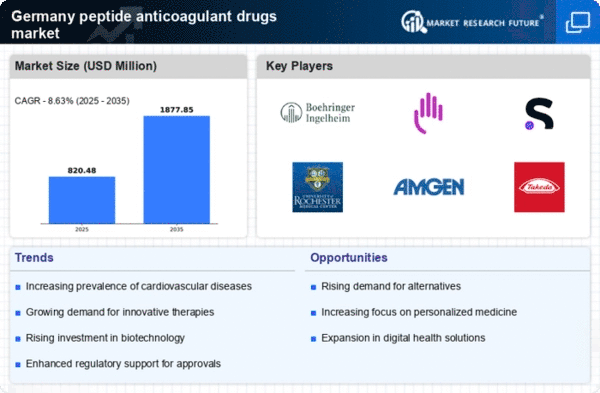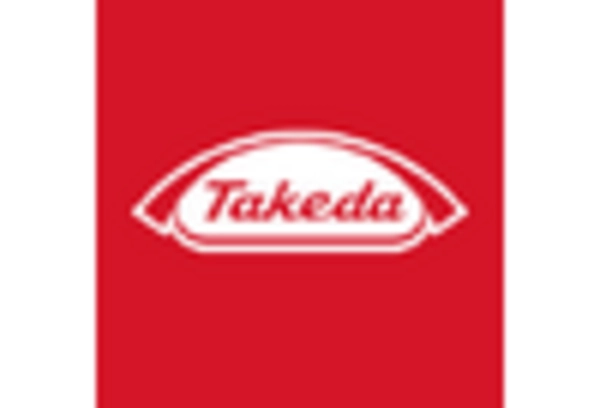Rising Geriatric Population
The rising geriatric population in Germany is a significant driver for the peptide anticoagulant-drugs market. As the population ages, the prevalence of age-related health conditions, including thromboembolic disorders, is expected to increase. Current demographic data indicates that approximately 22% of the German population is aged 65 and older, a figure projected to rise in the coming years. This demographic shift necessitates the development of effective anticoagulant therapies tailored to the unique needs of older patients, who often present with multiple comorbidities. Peptide anticoagulants, with their favorable safety profiles and targeted mechanisms, are well-positioned to address these challenges. Consequently, the peptide anticoagulant-drugs market is likely to expand as healthcare providers seek to manage the growing burden of thromboembolic events in the aging population.
Advancements in Clinical Research
Advancements in clinical research methodologies are propelling the peptide anticoagulant-drugs market forward in Germany. The integration of cutting-edge technologies, such as artificial intelligence and machine learning, into clinical trials is enhancing the efficiency and accuracy of drug development processes. These innovations facilitate the identification of potential candidates for peptide anticoagulants, thereby accelerating their time to market. Furthermore, the German regulatory environment supports rigorous clinical testing, ensuring that new therapies meet high safety and efficacy standards. As a result, the peptide anticoagulant-drugs market is witnessing an influx of novel products, with several candidates currently undergoing clinical trials. This dynamic research landscape not only fosters competition but also encourages investment in the development of peptide-based therapies, ultimately benefiting patients with thromboembolic disorders.
Growing Awareness of Anticoagulant Therapy
The growing awareness of anticoagulant therapy among healthcare professionals and patients is significantly influencing the peptide anticoagulant-drugs market in Germany. Educational initiatives and campaigns aimed at highlighting the importance of anticoagulation in preventing thromboembolic events are becoming more prevalent. As a result, healthcare providers are increasingly prescribing peptide anticoagulants, which are perceived to offer enhanced safety and efficacy compared to traditional options. Market data indicates that the adoption rate of peptide anticoagulants has increased by approximately 15% over the past two years, reflecting a shift in treatment paradigms. This heightened awareness not only drives demand but also encourages pharmaceutical companies to invest in the development of new peptide-based therapies, further expanding the market landscape.
Regulatory Support for Innovative Therapies
Regulatory support for innovative therapies is a pivotal driver for the peptide anticoagulant-drugs market in Germany. The German Medicines Agency (BfArM) has established frameworks that facilitate the approval of novel therapeutic agents, particularly those that demonstrate significant advancements over existing treatments. This supportive regulatory environment encourages pharmaceutical companies to invest in research and development of peptide anticoagulants, which are often characterized by their unique mechanisms of action and improved safety profiles. As a result, several peptide anticoagulant candidates are currently in various stages of development, with expectations for increased market entry in the coming years. This trend not only enhances competition within the market but also provides patients with a broader array of treatment options, ultimately benefiting public health.
Increasing Incidence of Thromboembolic Disorders
The rising incidence of thromboembolic disorders in Germany is a crucial driver for the peptide anticoagulant-drugs market. Conditions such as deep vein thrombosis (DVT) and pulmonary embolism (PE) are becoming more prevalent, leading to a heightened demand for effective treatment options. According to recent health statistics, thromboembolic events affect approximately 1 in 1,000 individuals annually in Germany. This growing patient population necessitates innovative therapeutic solutions, particularly those that offer improved safety profiles and efficacy. Peptide anticoagulants, known for their targeted action and reduced side effects, are increasingly being recognized as viable alternatives to traditional anticoagulants. As healthcare providers seek to enhance patient outcomes, the peptide anticoagulant-drugs market will likely experience significant growth in response to this rising clinical need..
















